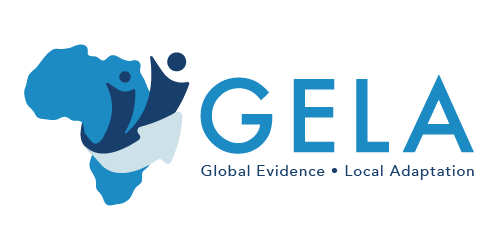Global Evidence - Local Adaptation (GELA): Grant to enhance evidence-informed guideline recommendations for newborn and young child health in three sub-Saharan African countries
The European and Developing Countries Clinical Trials Partnership (EDCTP) has awarded three-year (2022 – 2025) funding of over 3 million Euro to a partnership coordinated by South African Medical Research Council along with partners from the Norwegian University of Science and Technology, Western Norway University of Applied Science, Stellenbosch University (South Africa), University of Calabar Teaching Hospital (Nigeria), Kamuzu University of Health Sciences (Malawi), Cochrane and the MAGIC Evidence Ecosystem Foundation (Norway).
The project is titled GELA - Global Evidence, Local Adaptation and will aim to enhance evidence-informed guideline recommendations for newborn and young child health in three countries in sub-Saharan Africa. See the GELA brochure

GELA aims to maximise the impact of evidence for poverty-related diseases by increasing the capacity of decision makers and researchers to use global research to develop locally relevant guidelines for newborn and child health. The project will support decision makers in South Africa, Malawi and Nigeria, and will build on and add value to the large-scale programme of child-health guideline development led by the World Health Organization (WHO), with adaptation and implementation led by the WHO Afro regional office, country offices and national ministries.
“Despite progress in the health of newborns and children, most sub-Saharan African countries have not met the Sustainable Development Goals for under-five mortality,” said Tamara Kredo of Cochrane SA. “In the context of COVID-19, even though most children present with mild conditions, the consequences of the pandemic are being felt on health systems and services, hampering healthcare delivery to children and increasing poverty, food insecurity and inequity. To address these issues, policy makers and practitioners not only need evidence-based guidance on effective clinical care, they also need guidance on how to implement this care efficiently within the context of their own health systems, considering inequity (in health and access to services) caused by poverty and other factors.”
“MAGIC is thrilled to be partner in GELA,” said Per Olav Vandvik. “The need to allow WHO guidelines to make an impact in member states is critical. Now is the time to show this is possible and we believe this strong consortium of partners is excellently placed to get the work done.”
“Clinical practice guidelines offer a means to bridge the gap between research evidence and practice and are essential policy-implementation tools supporting implementation of effective, cost-effective healthcare,” added Kredo.
This project is part of the EDCTP2 programme supported by the European Union (grant number RIA2020S-3303-GELA).
The specific objectives are to:
- ENGAGE: Identify child and newborn priority topics and the capacity needs of guideline panels.
- SYNTHESISE: Support policy makers and researchers to find, appraise and use best-available systematic reviews and guidelines.
- DECIDE: Support guideline panels’ capacity to contextualise global evidence using transparent, digitally supported standards and WHO methods for guideline development.
- SHARE: Disseminate and communicate guideline recommendations to healthcare providers and the public using innovative and user-friendly formats and digital platforms.
- LEARN: Strengthen capacity of researchers and policy makers for all aspects of guideline development, adaptation and dissemination.
- EVALUATE: Monitor and evaluate policy makers’ experiences of this approach, preferences for receiving evidence, capacity development and overall impact of the project on evidence-informed decision-making processes.
GELA will incorporate a multi-faceted, multidisciplinary research and capacity-strengthening programme using primary and secondary research, guideline-adaptation methodology and digital platforms to support delivery and dynamic local adaptation. This is enabled through a project team of African and international leaders in the field of evidence-based healthcare and guidelines methods partnering with national ministries in Malawi, Nigeria and South Africa, the WHO and its Afro regional office and the civil society group, Peoples Health Movement.
The European and Developing Countries Clinical Trials Partnership (EDCTP) is a public-public partnership between countries in Europe and sub-Saharan Africa, supported by the European Union. EDCTP focuses on enhancing research capacity and accelerating the development of new or improved medical interventions for the identification, treatment and prevention of poverty-related infectious diseases, including emerging and re-emerging diseases in sub-Saharan Africa, through all phases of clinical trials, with emphasis on phase II and III trials.

This webpage was produced by the GELA project which is part of the EDCTP2 programme (grant number RIA2020S-3303-GELA) supported by the European Union. The views and opinions of the authors expressed herein do not necessarily state or reflect those of EDCTP.

